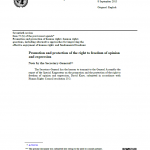
In the report, submitted in accordance with Human Rights Council resolution 25/2, the Special Rapporteur on the promotion and protection of the right to freedom of opinion and expression addresses the protection of sources of information and whistle-blowers. Everyone enjoys the right to access to information, an essential tool for the public’s participation in political affairs, democratic governance and accountability. In many situations, sources of information and whistle-blowers make access to information possible, for which they deserve the strongest protection in law and in practice. Drawing on international and national law and practice, the Special Rapporteur highlights the key elements of a framework for the protection of sources and whistle-blowers.
